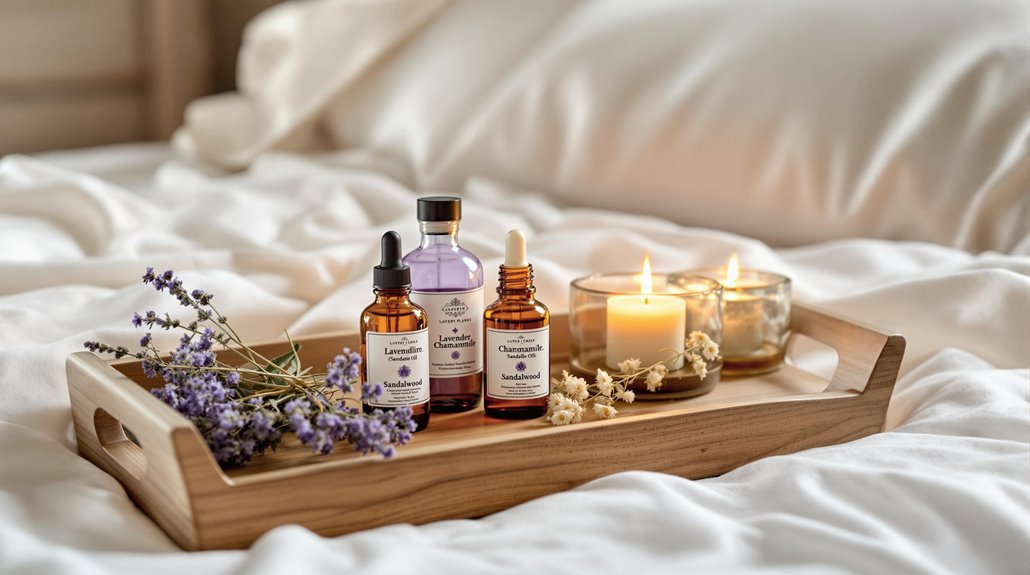
Improve your sleep hygiene with essential oils, creating a soothing environment for restful nights. Lavender is excellent for reducing anxiety and enhancing deep slumber, while chamomile relaxes your mind and eases stress. Bergamot lowers stress and stabilizes your mood, promoting peaceful sleep. Cedarwood serves as a natural sedative, and clary sage transforms stress into calmness. Ylang-ylang combines beautifully with lavender to boost your sleep quality. Use these oils in a diffuser or apply to pulse points for maximum effect. With the right blend and application, you can transform how you sleep and discover more about the best practices involved.
Benefits of Essential Oils
Essential oils provide an array of benefits that can considerably enhance sleep quality. By using essential oil blends, you can create a calming sleep environment that helps you break free from the chains of anxiety and stress. Oils like lavender and chamomile are known to reduce anxiety, allowing you to relax deeply. Thanks to bergamot oil, your blood pressure can decrease, soothing your mind and preparing you for a restful night. Inhalation of lavender essential oil has been shown to lower anxiety in cardiac patients, further illustrating its potential to improve sleep quality.
Imagine slipping into a sleep environment that not only relaxes your muscles but also eases your racing mind. Valerian oil offers muscle-relaxing properties to help your body settle into sleep, while ylang-ylang increases calmness, helping you gently drift off. As you inhale the comforting scents, your heart rate slows, bringing a gentle wave of tranquility over you.
Let’s not forget the emotional release offered by these oils. Cedarwood, with its mood-enhancing qualities, can transform your emotional landscape, freeing your mind from tension. A restful sleep is essential for daily functioning, influencing cognitive abilities and mood stability.
The essential oil blends can also support cognitive liberation, as lavender influences melatonin levels and brain function, ensuring your sleep cycle aligns with your natural rhythm. Embrace these natural remedies and transform your nights into liberated, restorative experiences.
Popular Oils for Sleep
When it comes to achieving a restful night’s sleep, popular essential oils like lavender, chamomile, and bergamot hold a prominent place in the domain of natural remedies. Lavender is revered for its calming effects, making it a staple in sleep rituals for those seeking tranquility. Its aromatic properties soothe the mind, allowing for a gentle drift into slumber. Chamomile, with its relaxing virtues, is particularly beneficial for anyone battling anxiety, while bergamot’s ability to alleviate stress transforms your bedtime routine into a harmonious experience. Chamomile, in particular, is noted for its sedative properties, as it aids in the reduction of anxiety, enhancing tranquility for a more restful sleep. Don’t let your sleep struggles restrain you from feeling rejuvenated. Embrace the liberation these oils can offer. Cedarwood, known for activating the parasympathetic nervous system, wraps you in its sedative embrace, gently encouraging sleep. Clary sage takes it a notch higher, working to reduce cortisol levels and anxiety, turning night-time chaos into serenity. These essential oils, with their aromatic properties, allow you to craft a personalized sleep ritual that speaks to your spirit. Combining lavender and bergamot for deeper relaxation, or relaxing with cedarwood and other blends, you’re not just improving sleep quality—you’re reclaiming your nights. Find your harmony and wake up refreshed and free.
Scientific Evidence
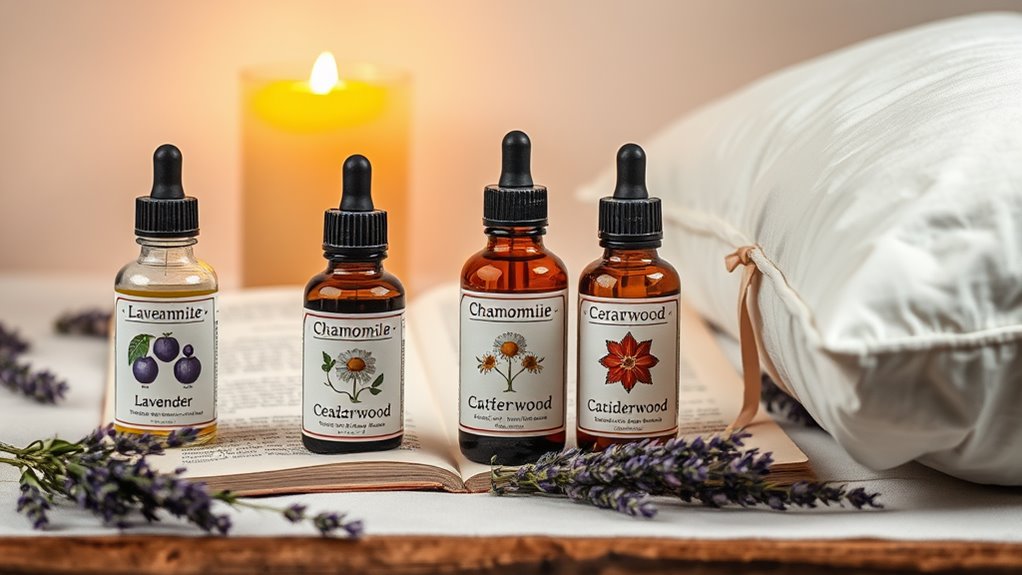
Scientific studies robustly support the benefits of essential oils, particularly for enhancing sleep quality. Aromatherapy research has demonstrated exciting results, revealing that lavender oil consistently improves sleep quality across diverse groups. From insomnia sufferers to postpartum mothers, lavender shows promise in clinical applications. Imagine tapping into a natural alternative that not only reduces sleep onset latency but also boosts total sleep time—that’s the power essential oils can offer you. This isn’t just anecdotal evidence. Systematic reviews and meta-analyses report that a whopping 66.7% of studies confirm the efficacy of aromatherapy in improving sleep. Populations from cardiac rehabilitation patients to nursing home residents show significant improvements in sleep quality through this fragrant therapy. In a randomized clinical trial, lavender essential oil was shown to significantly improve the quality of life for postmenopausal women suffering from insomnia. Different oils, like chamomile and cedarwood, don’t just smell nice—they work wonders on your nervous system, reducing anxiety and activating your parasympathetic nervous system for better rest. Even with these fascinating findings, the call for further research echoes. Chronic inflammation can also impact sleep quality, indicating a holistic approach of tackling inflammation and improving sleep through essential oils may be beneficial. While we’ve made substantial strides, the mystery of how these oils work their magic on sleep remains partially unsolved. However, the documented benefits urge you to contemplate essential oils as a potential shield against sleepless nights, inviting a sense of freedom into your life.
Effective Oil Blends
Exploring effective oil blends can often feel like unfastening nature’s toolbox for a good night’s sleep. These aromatic combinations present a liberating way to enhance sleep, free from chemical dependencies. Let’s explore some powerful blends and their unique benefits:
| Blend | Benefits |
|---|---|
| Lavender, Bergamot, and Ylang-Ylang | Improves sleep quality in individuals with heart issues |
| Chamomile, Lavender, and Neroli | Reduces anxiety, improves sleep for ICU patients |
| Cedarwood, Cypress, and Pine | Enhances sleep duration for older adults with dementia |
| Frankincense, Sandalwood, and Mandarin | Boosts sleep quality; favored by 64% of cancer patients using aromasticks |
Consider the calming symphony of Chamomile, Lavender, and Neroli. It helps anxious minds find rest, especially essential for intensive care patients. Meanwhile, Cedarwood, Cypress, and Pine form a protective cocoon for older adults, extending their sleep and minimizing disturbances. The act of outdoor activities is linked to enhancing self-esteem, which shows the power of nature in improving mental well-being. With the added benefit that bergamot can help with stress relief, another intriguing combination, Lavender, Bergamot, and Ylang-Ylang, supports those with heart conditions, subtly cradling them into deeper rest.
These blends empower your sleep hygiene by addressing specific conditions through the art of natural fragrances. You’re not just enhancing sleep; you’re liberating your mind from the chaos and reclaiming tranquility, one aromatic breath at a time.
Application Techniques
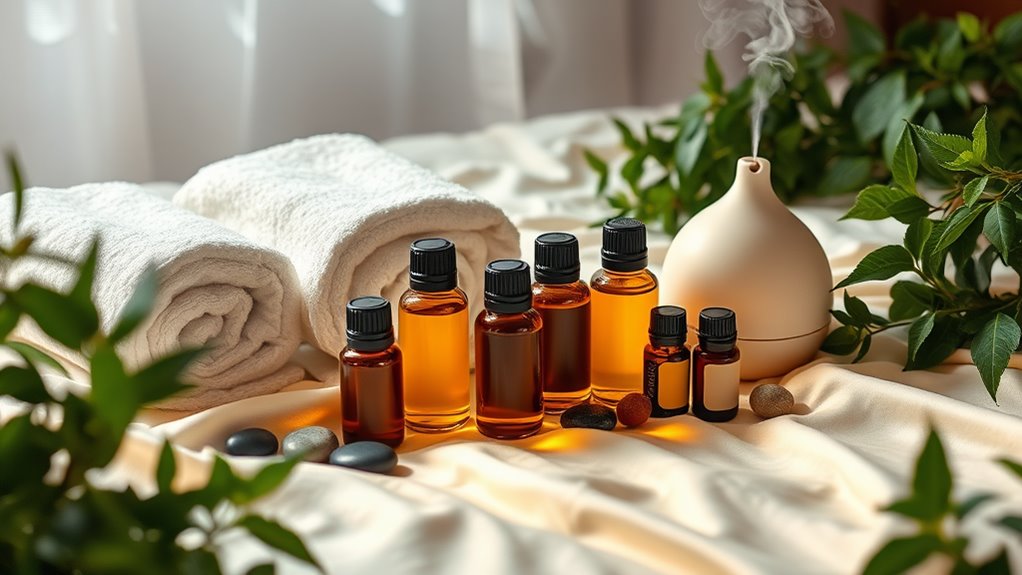
Harnessing the power of essential oils through different application techniques can transform your sleep environment into a tranquil haven.
Imagine stepping into a space that instantly unchains you from the clutches of stress and restlessness. With inhalation methods and topical applications, you can create a sanctuary that invites deep, restful sleep. Aromatherapy operates by stimulating the sense of smell and skin absorption, offering potential relief for sleep-related concerns.
Using inhalation methods opens the door to serenity:
- Diffusers: Ultrasonic, burner, or reed diffusers disperse pure essential oils, filling the air with calming scents.
- Steam Inhalation: Add essential oils to hot water, breathe in the vapor, and allow the tranquility to envelop you.
- Direct Inhalation: Rub diluted oil on your palms, cup them around your nose, and draw in deep, soothing breaths.
- Sprays: Create a calming atmosphere by spritzing essential oil-infused mist onto bedding or into the air.
Topical applications let you wear peace itself:
- Massage Oils: Blend essential oils with carrier oils for a tension-relieving massage.
- Pulse Points: Apply diluted oils to wrists, temples, and behind the ears, embracing relaxation at every heartbeat.
- Skin Care Products: Infuse body lotions for a subtle touch of tranquility.
Freedom from the constraints of restlessness is within your reach.
Components and Their Effects
Each essential oil boasts unique properties that can enhance sleep quality through targeted effects. Aromatic compounds within these oils interact with your sleep mechanisms, offering liberation from restlessness and anxiety. Lavender oil stands out by reducing your time to fall asleep and enhancing restorative, slow-wave sleep. Its aromatic compounds improve sleep quality across various populations, especially when combined with sleep hygiene practices. Collagen supplementation may also enhance skin appearance and hydration, complementing overall wellness routines that promote restful sleep.
| Essential Oil | Primary Effects on Sleep |
|---|---|
| Lavender | Reduces time to sleep, enhances restorative sleep |
| Chamomile | Reduces anxiety, indirectly improves sleep |
| Cedarwood | Sedative effects, increases sleep time |
Chamomile oil holds a powerful effect on reducing anxiety, soothing your mind. Roman chamomile, in particular, enhances sleep quality, offering a sense of liberation from stress. For a more potent impact, try inhaling chamomile to experience the calming benefits personally. Cedarwood oil, rich in cedrol, acts as a sedative, improving your sleep duration and reducing disturbances, offering an escape from sleepless nights.
Other oils, like clary sage, lower cortisol and stress, while bergamot stabilizes blood pressure, inviting calm into your life. By understanding these components, you tap into nature’s arsenal to elevate your sleep experience, liberating you from insomnia’s grip. Studies highlight the effectiveness of essential oils like peppermint and lavender in supporting heart patients’ sleep quality, expanding the scope of aromatherapy’s potential benefits.
Safety and Precautions
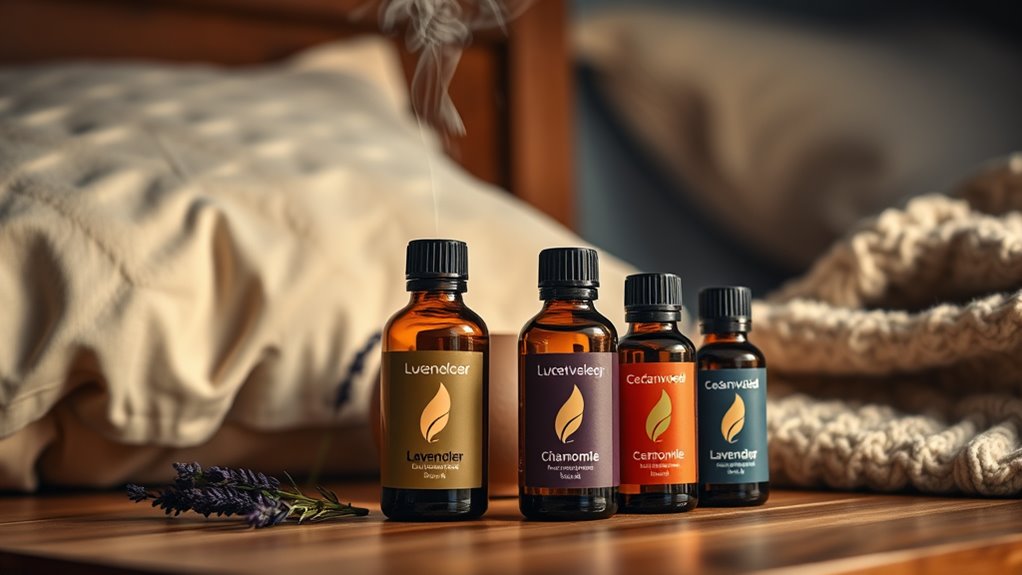
When using essential oils, safety should be your top priority to prevent unwanted reactions. Embracing your freedom to choose, consider these guidelines before delving into your essential oil journey.
Dilution methods are significant when applying oils topically. Always dilute with a carrier oil, like coconut or almond, to prevent skin irritation. Don’t let the allure of scents cloud your judgment; avoid ingestion unless under medical supervision. It’s important to remember that essential oils are not regulated by the FDA, which can lead to variability in quality across brands.
Allergy awareness is fundamental. Conduct a patch test to check for sensitivities before diving into regular use.
Here’s a focused rundown to keep your mind refreshed and liberated:
- Proper Dilution: Mix essential oils with a carrier oil to prevent irritations.
- Allergy Awareness: Patch-test new oils to avoid adverse reactions.
- Storage and Safety: Keep oils away from children and pets, out of reach or in a lockable cabinet.
- Usage Time: Limit diffusion times to 30–60 minute intervals to avoid respiratory issues.
Also, always use oils in a well-ventilated space and prioritize safety above all.
This careful approach guarantees you enjoy the oils’ benefits without compromising your well-being. Remember, freedom comes with responsibility.
Personalization and Preferences
While safety forms the foundation of your essential oil experience, the true charm lies in tailoring the oils to suit your unique needs and preferences. Immerse yourself in the world of scent preferences and oil combinations to discover what works best for you.
With essential oils, you’re free to explore your individuality by selecting aromas that resonate deeply with your personal taste. Whether you lean towards the soothing embrace of floral scents like Roman chamomile or prefer the rich, earthy notes of clary sage, there’s an oil ready to open your path to restful sleep.
Some stores offer aromatherapy consultations to help you personalize your choice of oils. Try blending to amplify effects that cater to your specific sleep challenges. Combine lavender and chamomile for added relaxation or reach for a mix of bergamot and ylang-ylang to support heart health while enhancing your sleep quality.
Peppermint and frankincense may offer a revitalizing twist to those seeking to calm mental chatter. Feel liberated in how you apply them, whether it’s through a diffuser, a topical blend, or a soothing bath.
Lavender Enhances Restful Sleep
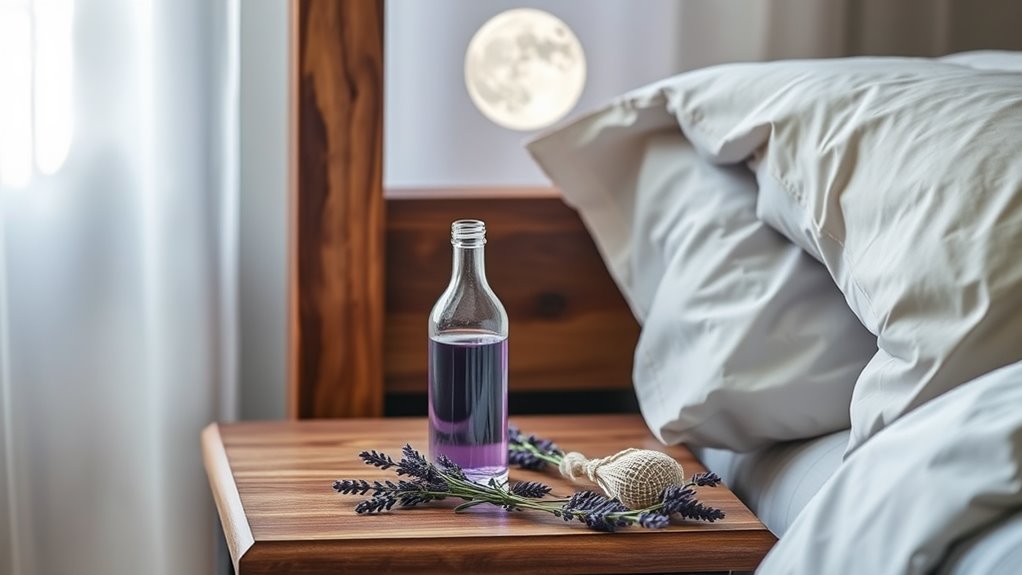
Throughout history, essential oils have been celebrated for their therapeutic qualities, with lavender emerging as a significant remedy to improve sleep. The enchanting aroma of lavender has long been associated with relaxation, and modern research substantiates its efficiency in promoting enhanced sleep patterns.
Lavender oil not only improves sleep quality by fostering deep sleep and extending sleep duration, but it also alleviates sleep disorders and reduces reliance on sleep medications. By calming the central nervous system and interacting with neurotransmitter GABA, lavender helps reduce stress, anxiety, and restlessness, paving the way for restful slumber.
Lavender’s versatile benefits span all age groups, offering improved sleep for the elderly, new mothers, infants, college students, and menopausal women. By integrating its use into nightly routines through diffusion, topical application, or combination with other soothing oils, individuals can cultivate a peaceful atmosphere conducive to healing rest. Regular use of lavender can be complemented by mindfulness meditation, which further enhances relaxation and the quality of sleep.
The inclusion of lavender in sleep rituals signifies not merely a nod to tradition but an embrace of a scientifically backed method to enhance quality of life.
In essence, lavender oil’s myriad benefits render it an essential inclusion in sleep management strategies. Its consistent application has shown time and again to be beneficial in establishing healthy sleep patterns and alleviating sleep-related challenges.
As we navigate the demands of modern life, the grounding and calming properties of lavender offer an accessible, natural solution to one of the most universal challenges: achieving restorative sleep. By trusting in the ancient wisdom of essential oils and validating it through contemporary science, we can cultivate a deeper connection to the holistic practices that nurture both body and mind, encouraging a balance that supports well-being in its entirety.














